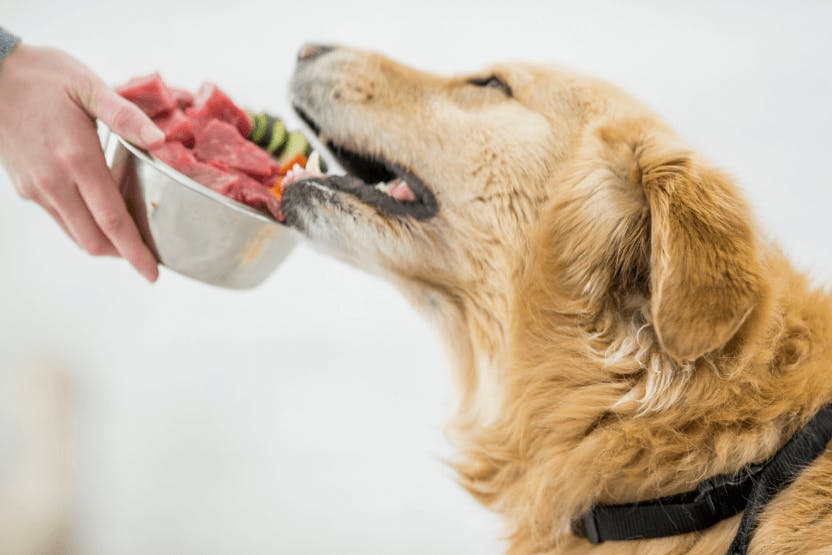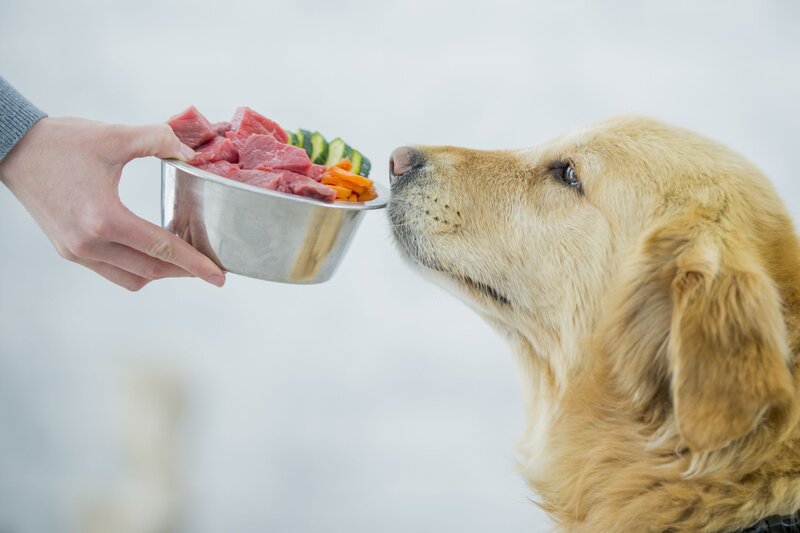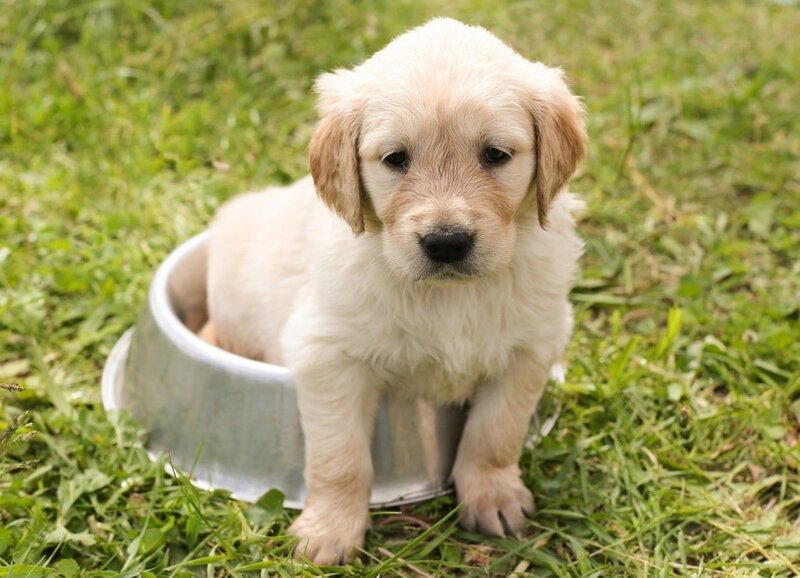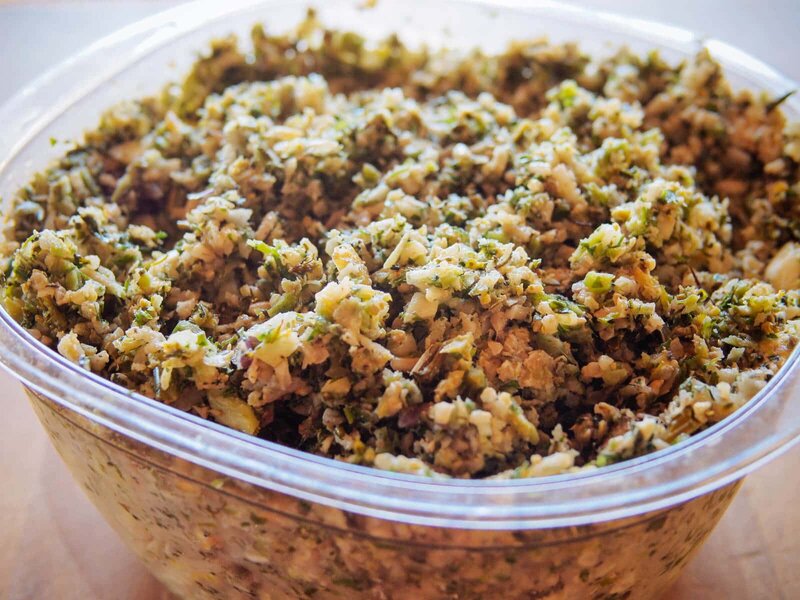With recalls and knowledge regarding commercial dog foods continually changing, an increasing number of dog owners are choosing to make their own dog food at home. However, preparing golden retriever homemade dog food differs from creating dinner for yourself or other human family members. To successfully keep your golden retriever healthy, you must follow several important rules and guidelines.
Besides, we compiled a list of the best dog food for golden retrievers after careful research to keep your dog healthy on our homepage. Check it out if you do not feel confident making homemade dog food for your furry friend!
Should you feed your golden retriever homemade dog food?

Golden retriever homemade diets are becoming increasingly popular, in part because the ingredients can be managed, eliminating the risk of dog food recalls. Furthermore, many people are attempting to eat healthier and expect the same thing for their dogs. Some people choose homemade diets as they include real food items, which are thought to be healthier than manufactured dry or wet golden retriever food.
Golden retriever homemade dog food may help prevent illnesses like:
- Allergies
- Arthritis
- Liver disease
- Diabetes
- Gastrointestinal problems
- Kidney disease
- Obesity
- Constipation and diarrhea
- Skin rashes and sores
- Upset or frequently sensitive stomach
- Yeast infections
Read more >> 7 Best Dog Food For Golden Retrievers With Sensitive Stomach
A simple homemade dog food for golden retrievers may satisfy any nutritional deficiencies, such as inadequate levels of important amino acids from home-cooked proteins or insufficient amounts of calcium, potassium, and magnesium derived from mineral-rich dark leafy greens.
However, it is important to note that home-cooked food for dogs is not suitable for all. There are a few things to think about before switching your golden retriever to a homemade diet:
- Find a golden retriever homemade dog food formula that is complete and healthy. One of the most common mistakes you may make is feeding your dog an incomplete or uneven diet.
- It needs time to gauge ingredients and make dishes properly. Ensure that you have a timetable that enables you enough time to properly prepare your dog’s food properly.
- Check that you can afford the supplies needed for homemade dog food. Homemade food is normally more affordable than commercially prepared fresh or raw food for dogs, but slightly more costly than kibble.
- If your golden retriever is fussy, you might want to obtain various recipes so you can modify his meals regularly and keep him interested.
Proper Nutrition in Golden Retriever Homemade Dog Food

Dogs, like humans, require nutritional support to thrive. Golden retrievers’ nutritional requirements differ from ours, therefore you can’t just start sharing your dinner with your dog. An insufficient or uneven diet can cause vitamin and nutritional deficits in dogs.
Golden retrievers require adequate calories to satisfy their energy needs. The daily calorie requirements of a golden retriever are determined by its life stage and degree of activity. Your veterinarian may assist you figure out the number of calories your dog requires each day.
Golden Retriever homemade dog food should include a proper amount of protein, carbs, fiber, and fat. Minerals and vitamins have to be supplied to the diet to make it complete and balanced.
Here are key elements of the canine diet:
- Protein: Following the ACVN (American College of Veterinary Nutrition), dogs’ meals must include protein that contains ten necessary amino acids that their systems cannot synthesize. This is important for the production of glucose, which is converted into energy. Protein-rich foods contain chicken and turkey (after eliminating bones, fat, and skin), beef and lamb, pig in moderate amounts, salmon, and a few other fish like walleye, whitefish, flounder, herring, and Arctic char.
- Fats and fatty acids: The most significant sources of fat in a golden retriever’s diet are the fats from animals and plant seed oils. A balanced diet delivers the fatty acids that the dog’s body does not produce. Fatty acids promote cell function and structure, make skin and fur healthy, and improve food flavor. Fatty acid supplies include plant-based oils such as canola, corn, soybeans, and flaxseed oil, along with fish oil.
- Carbohydrates: Sugars, starches, and dietary fibers provide some of the necessary energy that dogs require. Rice, spaghetti, oats, and quinoa are all possible sources.
- Fiber: Golden retrievers require fiber in their food to maintain their gastrointestinal (GI) tract working properly and to prevent them from getting overweight. Carrots, pumpkin, apples, dark greens such as spinach, brown rice, and flaxseed are all good sources of fiber for golden retrievers.
- Vitamins: Vitamins are essential for growth and upkeep. Vitamin shortages can cause a range of health issues, but they may also be harmful in large doses. Dogs need vitamin A from carrots and pumpkin; B from liver, green vegetables, and whole grains; C from fruits and vegetables, organ meat; D from livestock, fish, and vegetables; E from fish, leafy green vegetables, liver, bran, and plant oils; K from fish, leafy green vegetables, and fish; and choline from meats, fish, and egg yolks.
- Minerals: There are twelve necessary minerals for dogs.
- Calcium (tofu, green beans, broccoli, and cauliflower) and phosphorus (meat, eggs) promote healthy bones and teeth.
- Magnesium, potassium, salt, and chloride (found in veggies, fruits, and whole grains) help with nerve impulse transmission, muscular contraction, and cell signaling.
- Sulfur (in meat, fish, and molasses) promotes healthy skin, fur, and nails.
- Iron (in red meats, and poultry) helps to strengthen red blood cells and the immunological system.
- Iodine (from dairy, kelp, and shellfish) promotes thyroid health.
- Zinc (in eggs, lamb, liver, brewer’s yeast) benefits the immune system, skin, and fur.
- Selenium (in meat, veggies, shellfish, brown rice) can help improve the immune system.
- Copper (in whole grains, nuts, and shellfish) promotes healthy bone formation.
- Water: We sometimes ignore this essential component of a balanced dog’s diet, but there’s no pet food that includes enough water for your dog. Maintain clean, fresh water at all times.
If you’re willing to start preparing for your golden retriever, the initial step is to speak with your veterinarian. Your veterinarian may have recipes that you can try. You may also require an appointment with a veterinary nutritionist or a veterinarian who specializes in canine nutrition.
What to Notice When Feeding Golden Retriever Homemade Dog Food

It is critical to monitor your dog when transitioning to homemade dog food regularly.
- Contact a vet: If you have decided to switch your golden retriever to a homemade diet, the initial action should be to check with a veterinarian or veterinary nutritionist. Those specialists will analyze your dog’s age, size, and medical history before recommending a high-quality recipe that is suited to your dog’s exact nutritional requirements.
- Purchasing ingredients: When purchasing ingredients for your golden retriever’s homemade meals, pay as close attention to the origin, date of expiration, and labels as you would when purchasing food for yourself.
- Making the changeover gradually: When changing your dog’s food, both to a homemade diet and new commercial things, a gradual transition is ideal to prevent disturbing your dog’s digestive system. For a minimum of 5 to 7 days, steadily mix in increasing amounts of the new foods with the old diet, allowing your dog to adjust to the transition.
- Follow the recipe and rules: Make sure you follow the recipe. Tufts Cummings Veterinary Medical Center’s Clinical Nutrition Service researched to see how well owners followed homecooked meal recipes one year later. Just 13 percent still followed the original nutritionally balanced meal recipe.
- Clear guidelines: Guidelines for preparation and quantity are essential. The method by which you cook the ingredients, such as steaming, roasting, or boiling, might have an effect on the nutrition of the meal. Substituting or adding substances may also result in nutritional deficits. According to a study published in the Journal of the American Veterinary Medical Association, a lack of clear directions in numerous recipes drives owners of pets to make assumptions, which may result in nutritionally deficient food and can be toxic if served to your dog on a regular basis.
- Follow-up: Once you’ve completed the transition, keep an eye out for any digestive issues your dog may experience. If his feces softens, he vomits, or he gets diarrhea, see a veterinarian. As you adjust your dog’s meals, you must also monitor his weight. It may take some time to discover the appropriate portions for his size, age, and level of activity.
Sample Golden Retriever Dog Food Recipes

Veterinarians prepared the following homemade dog recipes for general use in healthy dogs. Before serving these or any other homemade diets to your dog, consult with your vet.
MSPCA-Angell Sample Dog Food Recipe
MSPCA-Angell recommends the following recipe for the average 60-pound adult dog with no medical conditions to interested pet owners. When prepared as directed, this meal is well-balanced for long-term feeding.
Homemade Diet Formulation: We recommend using a dietary gram scale for weighing these items until you understand their approximate volumes. Food scales are available at local grocery and huge discount stores. Food scales are available at local grocery and huge discount stores. To prevent your pet from picking out individual food components, combine all of them. A well-rounded handmade diet may result in an uneven nutrient intake if the ingredients separate and your golden retriever does not ingest the full food mixture.
These represent the cooked weights and daily amounts of each food component for an adult dog weighing 60 pounds (ideal weight). Final cooked weights fluctuate in terms of water amount and cooking time; however, weighing these items is more precise than measuring volume.
| Ingredients | ||
| Item | grams | common measure |
| Protein source: Chicken, dark meat cooked | 220 | 8 wt. oz. |
| Carbohydrate source: Rice, white, cooked | 530 | 3 ½ cups |
| Fiber source: Mixed vegetables | 45 | 3 Tbsp |
| Fat source: Vegetable oil | 15-25 | 3-5 tsp |
| Supplements to be mixed in the food: Balance IT Canine | 17 | 4 ¼ black scoops |
| Total 830 | ||
For a 60-pound dog, the daily caloric requirement is 1250 kcal. This food has 1.51 kcal per gram, so the dog should consume approximately 830 grams daily. We use a generic dog calculation to compute the starting meal dose, although this might vary by up to 50% for each dog. To determine if your dog needs more or less food, modify the amount by -/+ 25% based on their weight and condition. Always weigh your dog weekly while following this diet.
Conclusion
Making golden retriever homemade dog food can bring various advantages for your pet. However, make sure to confirm with your vet and always follow the rules and recipe to keep your golden retriever healthy. Besides the provided golden retriever homemade diet recipe above, there are many approved ones to make your dog meals interesting. Hope that your pet is balanced!

As a dedicated pet writer with a passion for Golden Retrievers, I’ve spent years studying and writing information to help owners give the finest care for their beautiful companions. While I do not personally own a Golden Retriever, my writing stems from a genuine love for the breed and a desire to provide useful, well-researched information. My goal is to provide practical and useful advice to Golden Retriever owners on topics such as food selection, common health conditions, and training strategies.

